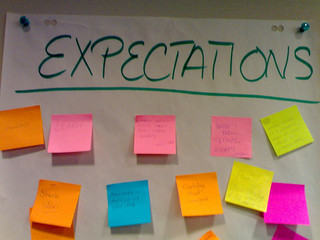Once again Kevin Eikenberry provides some great wisdom.
What Do You Expect? Four Areas of Expectations Required for Great Results
 Poor performance, turnover, conflict and disengagement. This reads like a checklist of most leaders’ worst fears. I know, because they get mentioned to me nearly every day when I talk with, coach, consult with and train leaders.
Poor performance, turnover, conflict and disengagement. This reads like a checklist of most leaders’ worst fears. I know, because they get mentioned to me nearly every day when I talk with, coach, consult with and train leaders.While there is no single silver bullet answer to solve all four of these problems, there is one major component common to all. Dissect issues of poor performance, look at the causes of employee turnover, find the root of most workplace conflicts and disengagement and you will find unclear or mismatched expectations.
But don’t just nod your head and agree with me philosophically; think about one of the challenges you face today as a leader – I’d be willing to wager unclear expectations is playing at least some role in the situation. Keep thinking about your situation and consider the four areas of expectations that follow. For optimum performance and strong relationships, make sure expectations are crystal clear in all four of these areas…
The work itself. People need to know exactly what is expected of them for the work itself. What levels of work quality are required? What defines successful completion of work? What are the boundaries on responsibilities? What are and what aren’t the roles of the job? This all includes, but goes beyond, the job description. For optimum performance and strong working relationships, these must all be clearly understood and mutually agreed to.
Most people might think this is enough. And to be honest, there are often big gaps here, and if you close these gaps things will improve dramatically. But there are three more areas of expectations worth clarifying and codifying.
The communication. How do we communicate? About what? When? How often? Using what medium? Communication is a critical component of organizational life and is far too important to leave to chance. Without clear expectations here, people operate based on their preferences and their habits, which might not meet the needs of others in the organization. More workplace conflicts probably start here than any other place. If you want to improve the communication in your organization, spend some time clarifying what is expected in your communication.
The time. Time gets in our way a lot too. What does “I need it Friday” mean? Does it mean it is on my desk at the start of my day or is the close of business fine? Does it matter when people work or how they work? Do people know what the expected response times are for inquiries from Customers, co-workers and leadership? If not, people may swing far from what you assume to be obvious. Without clarity here, people could either be on their email device 24/7 striving for immediate response, or at the other extreme assuming a couple of days is fine for that request.
The culture. People don’t work in a vacuum – the workplace itself is an important component of the work itself. When people are hired either fresh from school or from another organization, they bring their past experience and habits with them. If those experiences and habits differ from “the way things are done around here”, there will be mismatched expectations. These mismatches can lead to a perception that people aren’t a good fit, can be the initial source of poor performance (perceived or reality) and the root of interpersonal conflicts. Make sure that the organizational norms and overall expectations are explained. Help people see that understanding and matching their behavior with cultural expectations, while more subtle than some other factors, is incredibly important to their success.
Human beings operate and perform based on their view of the world. In the absence of clear expectations, they create their own worldview. The nasty words we use for that are – we assume. To create great performance, improve employee satisfaction and engagement and reduce the incidences of workplace conflict, spend more time on setting clear expectations.
When you do that everyone knows the answer to “what do you expect?” and more success will follow.
No comments:
Post a Comment